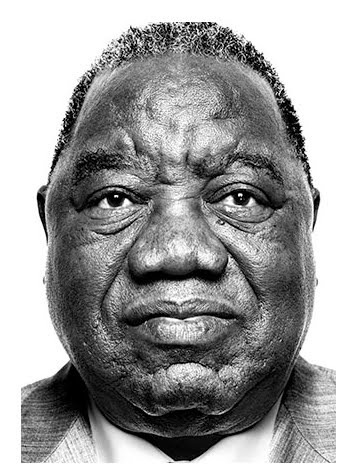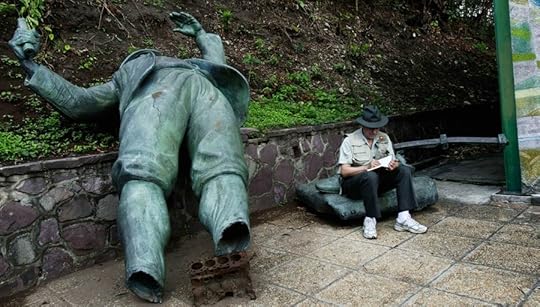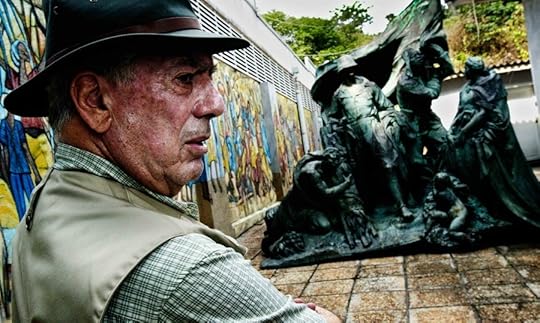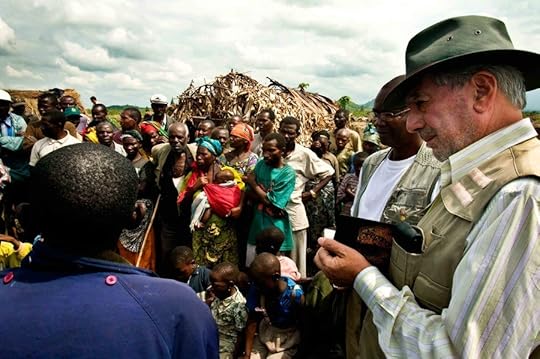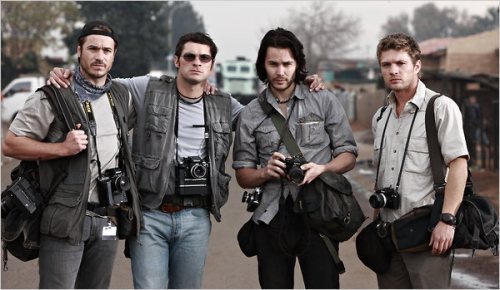Sean Jacobs's Blog, page 622
August 3, 2011
Elections in Zambia
In the 3rd grade, I came back fresh from my first civics lesson in Mrs. Marshall's class at Nkana Trust School, to announce, "Zambia is a One-Party Participatory Democracy. Kenneth Kaunda is our President. He believes in Humanism and UNIP won 99.99% of the vote." I think my father mumbled something that expressed the trifecta of his disdain for what passed for civics in my school, the ridiculousness of the construct of a 'One-Party Democracy' and the hilarity of getting 99.99% of the vote. But he kept his sarcastic retort jovial – only partially because he probably didn't want to discourage my enthusiasm. He was well aware of the grace under which we lived: peaceful Zambia, to which people from all nations could come and live, be they Angolans, Zairians, Rhodesians (then), South Africans, or from the many nations of Europe. 'Zambia in the Sun' even permitted the likes of us, Sri Lankans, whose home island was on the fast track to civil war. KK's grace seemed to extend to everyone, until the first violent strikes by Zambian mine workers reminded us that Zambians were the real losers here: they were paid less, and given far fewer benefits than their 'foreign-born' counterparts.
Of course, foreigners and Zambians alike loved 'batata KK', his ubiquitous safari suits and white handkerchief, which was rumoured to have been given to him as a talisman of protection by an Indian. It's true we didn't get what he was talking about when he switched from calling us his 'children' or his 'people' to 'comrades'. It seemed an unnecessary distance to leap. KK explained, on the front page of the Times of Zambia, that he had been told that calling his countrymen 'his children' was 'paternalistic'. But we couldn't figure out what was wrong with being a little paternal.
After I arrived for university in the US, aided by the benefits given to expatriate workers – one of which was that the company would subsidise a portion of our educations abroad – the nations towards which Zambia looked for economic and political support collapsed under a wave of change: Perestroika and Gorbachov, the fall of the Berlin Wall, and the end of the dictatorships throughout other Soviet Bloc nations made Zambians reconsider their loyalty to the United National Independence Party (the UNIP of above) and the beloved figure of KK. They also wanted multiparty elections. After nearly 30 years in power, KK was ousted by the weasly, decidedly unstatesman-like Frederick Chiluba of the Movement for Multi-Party Democracy (MMD). When that man was eventually brought up for charges of corruption, for which the exhibit 'A' of evidence was his extensive collection of tiny, multi-coloured crocodile shoes (Chiluba was a diminutive man), I think that Zambians were finally able to freely make jokes about the relationship between foot-size and another portion of the male anatomy, and why a man with such tiny feet would need to be so declarative about his capacity to collect so many shoes.
The MMD has remained in power since that decisive victory over UNIP in 1991. The third president, Levy Mwanawansa, died in office; Rupiah Banda became acting president, and went on to win the presidency in 2008. Zambians have been disappointed by the experiment with multiparty elections. The presidents who followed KK have neither had the political acumen, nor the gentleman's touch for which KK was famous (there's great archival footage of him ballroom dancing with Margaret Thatcher, after the Commonwealth Heads Government meeting in Lusaka, 1979). And the fall of copper prices, the sale of the nation's largest income generator to various foreign interests – from Anglo-American to Chinese and Indian companies – and the brutal entrance of the IMF's policies meant that Zambia went from being the nation with the highest GDP in Africa to being one of the poorest countries in the world.
The first decade of the 2000s saw Copper prices rise to blue-sky levels once again – but without much benefit to the ordinary Zambian, since the income generated goes to foreign companies – companies that are not building schools, offering university bursaries, or providing free health care, as was the norm during KK's rule. September 2011 will see Zambians return to the polls to cast their votes for a new presidential election. And again, a wave of freedom in formerly oppressed nations, countries to which Zambia once looked for comradeship (Egypt in particular) means that Zambians are also looking for change.
There's word that a Twitter and Facebook-led movement is underfoot: the Facebook group, 'Zambian People's Pact' may have a hand in the direction in which the Zambian elections may go. The members range from Lieutenant-Colonel Panji Kaunda (son of KK, and a fan of golf, basketball, and Manchester United), and several thousand others, many of whom probably never even experienced life as adults under KK's leadership. The group openly states that their major goal is to unite followers of all parties in order to oust the ruling Movement for Multi-Party Democracy (MMD). Whilst the debate on the page is passionate, with up to 800 and 1,000 posts per day documenting comments, reactions, and vitriol (mostly against each other), the membership is low: 5639 at last count. That's hardly enough for a revolution; rather, it may simply consist of a small, elite group of navel-gazers who'll generate more infighting and sycophantism than a genuine political upheaval. Hardly anyone can afford to have internet connections in Zambia, even via their mobile phones. Facebook is largely populated by aid workers and Zim expats, writing home and cruising for hookups. It is not a realm inhabited by 'the people'.
Meanwhile, out come the usual, entertaining crazy-auntie stories, in time for the election moon:
25th July: Former Defence minister Ben Mwila claims that former UNIP secretary general Sebastian Zulu received about K250 million from the State to destabilise the former ruling party UNIP and its leader Kenneth Kaunda at the time. Apparently, there's backup: Lusaka-based lawyer Sakwiba Sikota confirmed that when he represented petitioners in the 2001 presidential election petition, former Zambia State Security and Intelligence Services director general Xavier Chungu testified that the State actually paid Mr. Zulu K250 million for him to cause instability in UNIP – where he was the secretary general.
All this, because Mr. Zulu was earlier quoted in a daily tabloid, calling for change, saying there was too much corruption in the present government (Mwila clearly remains a supporter of the MMD). Mwila responded by broadcasting that "Sebastian Zulu is the reason why UNIP is dead today."
27th July: Former works and supply minister, Mike Mulongoti (dismissed from the MMD), revealed that he survived an attempt on his life while on his way to Lufwanyama on the Copperbelt on Saturday the 23rd; they were convoying to a "traditional ceremony". Mulongoti left ahead in another person's vehicle, while a colleague drove Mulongoti's car. On a lonely stretch of road, group of thugs raced to block the vehicle driven by Mulongoti's colleague. Mulongoti's colleague explained that he had narrowly managed to escape the vehicular assailants (its believed that they thought that Mulongoti was driving the car), and was too shocked to take down the license plates of the attackers' vehicle. Mulongoti had recently endorsed the candidature of PF leader Michael Sata, and attributed the attempt on his life to those in power, who wanted to silence his support for the opposition.
2nd August: In a move reminiscent of Tea Party tactics, PF (Patriotic Front) secretary general Wynter Kabimba disclosed that his party is in the process of petitioning the UN, SADC, NATO and other organisations over the parentage of president Banda, which the PF believes is foreign. President Rupiah Banda responded by asking why the issue was never brought up before, and magnanimously said that the PF is free to petition the UN over his parentage. We'll wait for him to show us a clip of the Lion King (birthplace: Luangwa National Park) as proof of his nationality.








August 2, 2011
Muthoni The Drummer Queen
Muthomi The Drummer Queen
Blitz the Ambassador talks African Cinema
Blitz the Ambassador (you know we like him) says a lot about African film making in 120 seconds.
H/T:Society HAE








Vargas Llosa in Congo
Not sure whether Peruvian author Mario Vargas Llosa's new novel, El Sueño del Celta (The Dream of the Celt), has been published in English yet — so I might be spoiling it for some future interested readers if it hasn't — but halfway through the story about the Irish diplomat-turned-nationalist Roger Casement, I already regretted coming across these photographs by Juan Carlos Tomasi (samples above and below) before reading the book. I couldn't help but picture Casement (who was sent to Congo in 1883, where he met H.M. Stanley and Joseph Conrad) as a nineteenth century Vargas Llosa on a field trip. Granted, the book is much better than Sir Vidia's.








August 1, 2011
Simphiwe Dana and Mthwakazi

Your Music Break: Simphiwe Dana, live, singing in Xhosa, accompanied by another South African singer, Mthwakazi, in Johannesburg.
H/T: Nerina Penzhorn (again).








August 1, Benin
Maybe not the most popular artist in Benin today, but the country's independence day is a good day to listen to Benin-born jazz guitarist Lionel 'Gilles' Loueke. This performance was recorded in Boston earlier this year:









July 31, 2011
Ramadan Kareem
Though it remains to be seen what political, economic and social changes will happen (if any) in the "New Egypt," its first Ramadan after Mubarak's downfall will undoubtably be memorable. Iftar in Tahrir will be magnificent, I have no doubt. But it might also be a tense affair for all involved, considering how vocal conservative religious factions have become in spite of the call for coalition-building. While Muslims are also supposed to abstain from anger, pride and other bad behaviours during Ramadan, the realities of daily life – such as the rising price of food – is difficult to ignore even by the most faithful.
There are still many things about Ramadan in Egypt which rarely change, however (like the Ramadan moon-sighting fights!). We share many of these Ramadan traditions with our neighbors worldwide – Muslim and non-Muslim – but I'm homesick enough to risk breaking my fast by taking pride in some of my most treasured memories of Ramadan in Egypt.
Every Ramadan, people decorate their apartment buildings with long strings of what are more commonly used as Christmas lights in the U.S. But as this decoration also indicates a wedding, an engagement or a birth, most Egyptians show off their lanterns. These lanterns, described in the video below, are often treasured and passed down through generations. Seeing them, you might understand why:

Each morning in many neighborhoods, a self-appointed masaharaty passes through on each street with his drum and his songs, waking sleeping families for suhoor – a pre-dawn meal before the fast begins:

The traffic in Egypt, considered the worst traffic in the world (we are the best drivers comparatively, of course!), is only ever quiet during the Taraweh prayers:
http://www.youtube.com/watch?v=Z5XYjn...
Lastly, a sight seen and heard everywhere in the world during Ramadan: massive crowds of people breaking their fast to a cacophony of adhans. Usually, the outdoor tables are set up in huge orange and red tents decorated with lanterns so people can pray on covered ground. This is a more utilitarian set-up, but the sound is incredible:
http://www.youtube.com/watch?v=E8Iq6X...
A few years ago, Al Jazeera featured a special on Ramadan in Cairo that is much more thorough in its scope. You can view it here. Ramadan Mubarak everyone.
Photo Credit: /Asmaa Waguih








July 29, 2011
Music Break / Ana Tijoux

Last week in Bolinas, CA, my friend, Kora McNaughton (she lives in Santiago), got me onto the music of Chilean rapper Ana Tijoux. (Interview–in English–from 2010 here.) I have her new album (a gift) to prove it. Too bad I won't be in the city Monday night when Ana Tijoux performs at SOB's.








Weekend Special, July 29*
"The Bang Bang Club," the Hollywood film about the four real-life white photographers who built their fame taking pictures of political violence in early 1990s South Africa, was released there this week. Most reviewers here (and in the UK) have panned the film. There reviewers are picking up on how the film treats some of the Bang Bang Club's black colleagues. Here's Philippa Garson, a colleague of the Bang Bang Club writing in The Mail & Guardian:
What bothered me most about 'The Bang Bang Club' was the distorted depiction of Abdul Shariff, who was caught in the crossfire and shot dead in Katlehong in January 1994. He is portrayed in the movie as a gawky young novice who eagerly asks to join the Bang Bang Club. After the group reluctantly allows him to tag along, he is killed in a gunfight in a graveyard in Soweto. In reality Shariff was an experienced and respected photographer who would never have asked to join the Bang Bang Club! It was irresponsible to portray him in this way. "In retrospect maybe it was a mistake, but it was unintended," [the film's director Steven Silver] says. For all those people who knew Shariff, this was certainly no small mistake.
And here's columnist Fred Khumalo in The Sunday Times:
… [I]t sickened me to see Alf Kumalo, one of the greats of SA photography, making a cameo appearance as an avuncular has-been whose only contribution to the narrative is giving the Marinovich character a warm welcome to The Star's photographic department. And – ah, yes – he also gets to admonish a young township radical who rails against members of the Bang Bang Club "profiting" from the suffering of black victims. According to the movie, Kumalo did not share a single nugget of photographic wisdom with the young bucks. Those who worked at The Star, and other photographers who interacted with the Bang Bang Club in the field, will tell you tales to the contrary.Those of us who have been around for some time in this crazy trade of words and pictures know that Oosterbroek, for one, spent many hours learning from Kumalo – about the finer points of photography, but also survival tips in the hot spots where the younger man was robbed of his wife's car, was shot and generally abused by fighters across the divide. There were others too: photographers Walter Dhladhla, Elmond Jiyane and Juda Ngwenya, to mention a few, who, because of their knowledge of the townships and the languages spoken there, were always eager to help photographers and journalists not familiar with the terrain.
Meanwhile, the paper for the black middle class, The City Press, just copied Bill Keller's review from The New York Times.
* The draw for the 2014 World Cup qualifiers is being held in Brazil today.
* Chief Boima went to Ghana. [Clustermag.com]
* Africa, Google wants you. Just ask The Next Web Africa.
* I got to watch South African photographer Zanele Muholi's very personal and revealing documentary "Difficult Love" this week. You can too. Watch out for a review of the film here soon by film director Nerina Penzhorn.
* South African graffiti artist Mak1One stopped by AIAC's "offices" in Fort Greene–courtesy of Dylan Valley. He's got some big things planned. When it's time I'll blog about it. He was in Rochester, NY, along with eight other artists including fellow South Africans, Freddy Sam and Faith 47, to work on a mural in a popular city park.
* There's a film in the works about the Israel is Apartheid thesis. It's by a South African and an Israeli. Not by Palestinians.
* The Women's World Cup is over now. I missed much of it, except the Brazil-USA semi-final. I was watching the Copa America instead. I was rooting against Uruguay of course. We don't forget. Anyway, back to the women's game. How did the African women's game–represented by Nigeria and Equitorial Guinea–do? Badly. Some perspective from The Footballers Scholars Forum; Football is Coming Home and From a Left Wing]
* Also watch out for a new documentary film about Cape Town struggle hero Ashley Kriel who was cornered and brutally murdered by police in 1987. We'll try and get a copy and interview the director Nadine Cloete. Here's a link (in Afrikaans) to a story about the film.
* Meanwhile, from the BBC: "A 50-year old … man woke up inside a mortuary over the weekend and screamed to be let out – scaring away attendants who thought he was a ghost. His family presumed he was dead when they could not wake him on Saturday night and contacted a private morgue in a rural village in the Eastern Cape. He spent almost 24 hours inside the morgue, the region's health department spokesman told the Sapa news agency. The two attendants later returned and called for an ambulance. " The man hardly looks 50 if you watch the video. The Associated Press' video report of the events is equally baffling. The AP got the provincial leader of the opposition Democratic Alliance in Johannesburg to comment on events (I don't know why) in the Eastern Cape which is a day trip away. Bloom is identified as "the spokesperson for the provincial health department."
* Remember Faaji Agba, the band I was raving about a few days ago as they prepared to come play in sweltering Brooklyn? Well, Alaba Pedro, the band's 72 year old guitarist died Tuesday on an Arik airline flight from New York City to Lagos. "Band members said Mr. Pedro had difficulties breathing one hour into the nine hour flight and died two hours later." [Sahara Reporters]
* Seun Kuti–Faaji Agba opened for him at Celebrate Brooklyn–has something to say to hip hop. Listen up 50 Cent, Officer Ricky and Lil Wayne:

* The check out files: A Dog's Life, a blog by a young, hip Kenyan.
* Meanwhile in Senegal Life President Abdoulaye Wade holds on for power.
* And a music break. From the East German-born tenor sax player Oliver Fox who collaborates regularly with Cape Town musicians. Here he performs in the Katya Sourikova Group live in Berlin:
* New poetry from Rustum Kozain.
* The amount of attention paid to white Afrikaans rock music inside and outside South Africa astonishes me given its limited reach and impact. Like this interview with the band Fokofpolisiekar who played to white expats in London. [Don't Panic]
Finally, first graders can have fun while learning about Africa. Like these kids in Baltimore. [Via Nomadic Wax]
* BTW, if you wonder about the title of this weekly post.








Sean Jacobs's Blog
- Sean Jacobs's profile
- 4 followers


